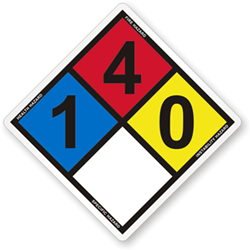Best Safety Practices When Handling Butane
Butane is one of the most powerful and popular fuel sources used around the world. As a highly flammable, colorless, and odorless easy liquefied gas, butane can be a health hazard when used improperly or for the wrong purposes. If you follow a simple set of safety guidelines, however, butane is one of the safest fuels to store and use both indoors and outdoors. Let’s take a look at a few of the very real risks associated with misuse of butane as well as best practices to avoid these dangers.
What are the Dangers of Butane?
Although the health risks of butane are very low when used correctly, it is a highly flammable and toxic gas that will cause serious problems when handled improperly. The risks of incorrect butane use are brutal and can be fatal.
- Inhalation
- Explosion
- Leaks
- Skin Exposure
Some have turned to huffing the butane from bottles or aerosols for a quick and easily obtained high. Although inhaling butane can result in euphoria, it can also lead to a host of medical problems such as fluctuating blood pressure, temporary memory loss, frostbite, drowsiness, narcosis, asphyxia, cardiac arrhythmia and in the more severe cases, even death. Butane is one of the most commonly misused substances, and accounts for about half of solvent-related fatalities.
As a highly flammable and pressurized gas, it’s possible that butane may explode if exposed to heat or used improperly. This volatile substance has been known to injure or even kill people when used incorrectly, damaging property and causing fires. Because butane gas is heavier than air, it may travel long distances before it finds a material that ignites it and then travel back to its source at lightning pace.
In its pure form, butane is an odorless and colorless gas that is not detectable to humans until it causes ill health effects or an explosion. Luckily, organic sulfur compounds are added to bottled butane that cause foul smells so that humans can detect a leak and vacate the premises before their safety is compromised.
If butane is poured on exposed skin or the eyes, it may cause frostbite or freeze burn. This is why butane refills must be handled carefully. Butane bottles that are designed for refilling will come with adaptors for refilling various types of appliances.
The Best Butane Safety Practices You Must Follow
Luckily, butane safety practices are just as important to butane companies as they are to consumers. Every butane company, from Lucienne butane to Puretane butane, is required to provide a material safety data sheet that gives customers specific information about the hazards associated with their product as well as safety precautions to follow. Be sure to read these thoroughly before using the product, but here are a few necessary steps that will help you to use butane safely and efficiently.
- Take precautions to avoid inhaling butane when using it for cooking, heating, or lighting.
- Keep butane canisters away from heat, sparks, open flame, and hot surfaces.
- Don’t smoke near butane or light a cigarette when using it.
- Store butane in a well-ventilated area away from direct sunlight and food and drink.
- Let lighters or canisters cool off before refilling them.
- Use only approved containers for storage.
- Keep storage containers closed and clearly labeled.
- Ground and bond containers during product transfers to avoid explosions. Use special slow load procedures if you’re refilling a container that was previously storing another fuel.
- When using butane industrially, cover eyes with goggles and wear an apron and protective, heat-resistant gloves.
- Do not try to extinguish a butane-caused fire until the source of the gas can be turned off.
- Never try to fight a large fire by yourself.
- Wash or consider disposing of clothing that has come into contact with butane. Sometimes, the gas can start a fire in the washing machine.
- And, as always, keep out of reach of children.
If you’re exposed to butane gas, follow these essential safety procedures and obtain medical attention immediately.
- Get to fresh air. If someone’s breathing is irregular or stops completely, give artificial respiration until medical personnel arrive.
- Immediately run exposed skin under warm water.
- Flush out eyes for at least fifteen minutes with warm water. Hold your eyelids open and away from the eye so that the whole surface is washed out.
We’d like to stress that these health and safety risks are extremely unlikely to occur, especially if you follow these few simple rules for properly handling butane. Use every precaution when refilling and storing butane, and think twice before engaging in any unauthorized uses of the gas. To find out more about butane safety, visit Butane Source and read the Material Safety Data Sheet for the butane brands that we carry.

